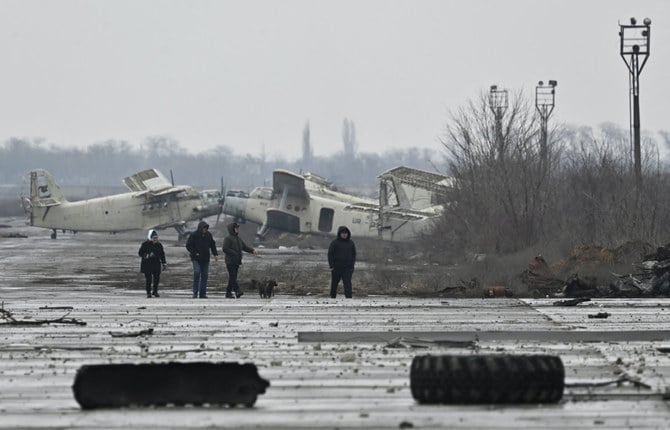
The recent diplomatic headlines have been made by the World Economic Forum, last week’s US-Japan summit and the standoff on the Ukraine border. This ensured the important UK-Australia defense and foreign policy ministerial meeting at the end of last week, the first since the pandemic, was left in the international shadows despite its significance.
At the meeting, UK Foreign Secretary Liz Truss and Defense Secretary Ben Wallace agreed with their Australian counterparts Marise Payne and Peter Dutton to strengthen economic, security and technology ties to confront growing global threats. This includes Australia regularly hosting two of the Royal Navy’s offshore patrol vessels in the future — a move that is expected to lay the foundations for future rotations of larger UK ships and submarines, as well as the possibility that British military assets could be based permanently in Australia. It is also possible that UK forces could undertake increased military training in Australia, including more personnel taking part in the biennial Australia-US Exercise Talisman Saber and the Royal Australian Air Force’s Exercise Pitch Black.
While some dismiss the importance of this deepening relationship, including the new AUKUS defense alliance with the US announced last autumn, it is seen as very important in London and Canberra. British National Security Adviser Stephen Lovegrove has called the trilateral partnership “perhaps the most significant capability collaboration anywhere in the world in the past six decades.”
These moves by British Prime Minister Boris Johnson and Australia’s Scott Morrison may well prove to be among the most important of their premierships. One sign that AUKUS was a big political call for Johnson is the criticism he got from predecessor Theresa May, who questioned whether the pact meant London could be enveloped in a war with Beijing over Taiwan, given the long-standing US security guarantees given to Taipei.
While the two countries are separated geographically, they have deep historical ties that predate China’s rise
Andrew Hammond
Johnson has dismissed that possibility, as has Truss, who said last week that China’s “economic coercion” of Australia is a “wake-up call” to other countries. She highlighted how China, which had been Australia’s top trading partner, introduced tariffs and other trade actions against the country on barley, wine, beef, seafood and coal exports when the relationship between the two nations soured in 2020. She said this was “one of the wake-up calls as to exactly what China was doing and the way it was using its economic might to try to exert control over other countries.”
While the UK and Australia are separated geographically, they have deep historical ties that predate China’s rise. The growing warmth between London and Canberra will bring new relevance to this long-standing partnership, including collaboration on a fleet of nuclear-powered submarines for the Australian Navy, with the British sharing advanced technologies, including know-how related to the submarines, cyber capabilities, and artificial intelligence.
So even though AUKUS is a new arrangement, it is only the latest chapter in the long history of UK-Australian security and political cooperation. For example, the Five Eyes security alliance stems from the remarkable intelligence relationship that the US and UK enjoyed in the Second World War, which was institutionalized in the 1946 BRUSA (later UKUSA) Agreement. Canada, Australia and New Zealand, as former UK dominions, began representing themselves in the intelligence pact in the late 1940s and 1950s, leading to developments like the 1951 ANZUS Treaty.
There have, of course, been some bumps in the road of UK-Australia security cooperation in recent years. These include divergences over the use of Chinese 5G telecommunications technology. Australia and the US have been the most vociferous in their opposition to such technology, with both banning the Chinese-headquartered telecoms firms from supplying equipment to their 5G networks. However, the UK (alongside fellow Five Eyes allies New Zealand and Canada) has had a more nuanced position. London had considered allowing Chinese firms a limited role in building “non-core” parts of the nation’s 5G network. However, Johnson ultimately U-turned on this issue under pressure from Canberra and Washington. Had there been a big breach between the UK and Australia on this issue, intelligence sharing could have been curtailed, denting ties.
So Johnson’s decision to double down on relations with Canberra ensures a high-stakes diplomatic balancing act for London, given its previous deep desire to form closer post-Brexit economic ties with China. The last two Conservative governments have increasingly perceived that enhancing relations with Beijing is in the UK’s national interest. But Johnson has now placed a higher post-Brexit priority on building stronger ties with Australia, and indeed the US, and the 2+2 meetings are another indication that he has decided to throw his lot in with Canberra and Washington, despite the costs this may bring in terms of the UK’s relationship with China.
Andrew Hammond is an Associate at LSE IDEAS at the London School of Economics.
Disclaimer: Views expressed by writers in this section are their own and do not necessarily reflect Arab News" point-of-view












